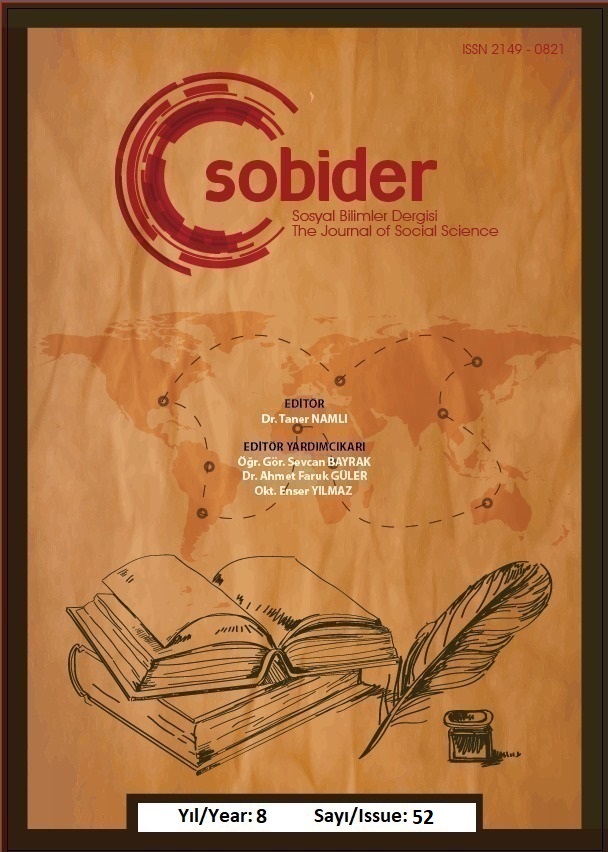Author :
Abstract
Vatan, insanların kültürel ve sosyal bağlar ile aidiyet hissettikleri önemli bir toprak parçası olarak ifade edilmektedir. Bireylerin vatan kavramı ile ilgili algıları da bu bakımdan oldukça önemlidir. Sosyal bilgiler dersi de vatan kavramına yer veren disiplinler arası bir derstir. Sosyal bilgiler dersinde vatan kavramı, gerek önemi gerekse güncelliği ile dikkat çekmektedir. Metafor ise, bireylerin bir kavram ya da konuya ilişkin algılarını ortaya koyarken başvurdukları benzetimsel ifadeler olarak anlaşılmaktadır. Bu araştırmada, Sosyal bilgiler öğretmen adaylarının vatan algılarını metaforlar yoluyla incelemek amaçlanmaktadır. Bu amaç kapsamında172 sosyal bilgiler öğretmen adayı çalışmaya dâhil edilmiştir. Araştırma, nitel araştırma yöntemlerinden olgubilim deseni (Fenemenoloji) ile yürütülürken, veriler ise içerik analizi ile çözümlenerek son şeklini almıştır. Bu açıdan araştırma, betimsel bir çalışmadır. Araştırma sonucunda öğretmen adaylarının vatan kavramına ilişkin olarak, 37 geçerli metafor geliştirdiği sonucuna ulaşılmıştır. Sonuç olarak, sosyal bilgiler öğretmen adaylarının vatan kavramına ilişkin metafor oluştururken sıklıkla“ev, anne, aile ve toprak” benzetimlerini kullandıkları görülmüştür.
Keywords
Abstract
The homeland is expressed as an important piece of land where people feel belonging through cultural and social ties. The perception of individuals regarding the concept of homeland is also very important in this respect. Social studies course is also an interdisciplinary course that gives place to the concept of Homeland. The concept of homeland in social studies class attracts attention because of both importance and currency. Metaphor is understood as simulation expressions that individuals refer while they reveal their perceptions about a concept or subject. In this research, the aim is to prevent homeland perception of social studies teacher candidates by using metaphors. In the concept of this aim, 172 social studies teacher candidates are included in study. While study is carried out with the phenomenology pattern (phenomenology) which is one of the qualitative research methods, data is finalized by content analysis. In this respect, research is a descriptive study. As a result of study about homeland perception of teacher candidates it is gained that 37 valid metaphors are developed. Finally, while social studies teacher candidates form homeland metaphors, it is seen that they use simulations of "home, mother, family and soil" often.
Keywords
- Andreopoulos, G. (2002). Human Rıghts Educatıon And Traınıng For Professıonals, International Review of Education – International eZeitschriftfürErziehungswissenschaft – RevueInternationale de l’Education, 48, ss. 239–249.
- Bulut, R., Koca, M. K. (2017). Sosyal Bilgiler Öğretmen Adaylarının Barış Kavramına İlişkin Metaforları. Turkish Studies, 12 (18), ss. 139-156.
- Cambridge Dictionary. (2019). Translation of “homeland” - English-Turkish dictionary. Cambridge Dictionary. 26.05.2019 tarihinde https://dictionary.cambridge.org/tr/s%C3%B6zl%C3%BCk/ingilizce/homeland adresinden erişildi.
- Candan, S.C., Öztaş, S. (2017). Secondary School Students’ Metaphors about the History Concept. Journal of History Culture and Art Research, 6 (2), ss. 507-526.
- Cowen, D. & Gilbert, E. (2008). Citizenship in the “Homeland” Families at War. (Edited By Deborah Cowen and Emily Gilbert). War, Citizenship, Territory. New York London: Routledge Taylor & Francis Group.
- Creswell, J. W. (2014). Research Design Qualitative, Quantitative, Mixed Methods Approaches. (Fourth Edition). Thousand Oaks, CA: Sage.
- Çatak, M., Yıldız, Ç. (2018). Ortaokul Öğrencilerinin Millet Kavramına İlişkin Metaforik Algıları. Turkish History Education Journal, 7(1), ss. 17-42.
- Çifçi, T. & Dikmenli, Y. (2016). “Üniversite Öğrencilerinin Vatan Algısı Ve Geçmişe Dönük Değişimi / ThePerceptions of University Students Regarding Homeland and Retrospective Change in These Perceptions”, TURKISH STUDIES -International Periodical for the Languages, Literature and History of TurkishorTurkic-, ISSN: 13082140, 11(3),DOI Number: http://dx.doi.org/10.7827/TurkishStudies.9286, p. 847-860.
- De Leon, R. F. (2016). A Framework for Homeland Strategy: Building Internal Capacity and Broadening Public Safety and Security. 1-15.
- Eliuz, Ü. (2010). Bahtiyar Vahapzade’de Vatan Temi ve Anne İlişkisi. Erdem, 57, ss. 64-73.
- Er Türküresin, H. (2018). Ortaokul Öğrencilerinin Vatan Kavramına İlişkin Algılarının Metaforlar Yoluyla Belirlenmesi. Internatıonal Journal Of Turkısh Educatıon Scıences, 6 (10), ss. 30-41.
- Gömleksiz, M.N. & Öner, Ü. (2016). “Ortaokul Öğrencilerinin Vatan Kavramına İlişkin Metaforik Algıları / Metaphorical Perceptions of Secondary School Students Toward the Concept of Homeland”, TURKISH STUDIES -International Periodical for the Languages, Literature and History of Turkish or Turkic-, ISSN: 1308-2140, 11(2), DOI Number: http://dx.doi.org/10.7827/Turkish Studies.9455, p. 1409-1420.
- Kaplan, A. (2003). Homeland In securities: Some Reflections on Language and Space. Radical HistoryReview 85, 82-93. Duke University Press. Project MUSE.
- Karabulut, B., Yılmaz, M. F., & Gündüz, M. (2020). İlkokul Hayat Bilgisi Dersinde Vatanseverlik Değerinin Etkinliklerle Öğretimi. Temel Eğitim Dergisi, 2(2), 34-41.
- MEB. (2018). Sosyal Bilgiler Öğretim Programı İlkokul ve Ortaokul 4, 5, 6 ve 7. Sınıflar. Ankara.
- Miles, M. B., Huberman, A. M. (1994). Qualitative Data Analysis (Second Edition). London and New Delhi: Thousand Oaks, CA: Sage Publications.
- Nostrand. Richard L. & Estaville. Lawrence E. Jr. (1993) Introduction: The Homeland Concept, Journal of CulturalGeography, 13:2, 1-4, DOI: 10.1080/08873639309478384.
- Özkan, R., Taşkın, M. A. (2014). İlköğretim Öğrencilerinin Vatan Olgusuna İlişkin Algılarının Belirlenmesi. Journal Of History School (Johs), 7(XVII),pp. 889-906.
- Sağdıç, M. & İlhan, G. O. (2018). Metaphoric perceptions of social studies teacher candidates on the homeland concept. International Journal of Geography and Geography Education, 38, 104-118.
- TDK (2019). Güncel Türkçe Sözlük. http://tdk.gov.tr adresinden 26.05.2019 tarihinde erişildi.
- Turan, M., Yıldırım, E., Tıkman, F. (2016). Öğretmen Adaylarının Eğitim Ve Bazı Temel Kavramlara İlişkin Metaforik Algıları. Nwsaes Education Sciences,11 (4), ss. 217-242.
- Yıldırım, A., Şimşek, H. (2008). Sosyal Bilimlerde Nitel Araştırma Yöntemleri. Ankara: Seçkin Yayınevi.
- Yılmaz, M., Duman, T. (2018). TRT Çocuk Dergisi’nde Milli Bir Değer Olarak “Vatan – Vatanseverlik” Değeri. İnsan Ve Toplum Bilimleri Araştırmaları Dergisi, 7 (2), ss.639657.





